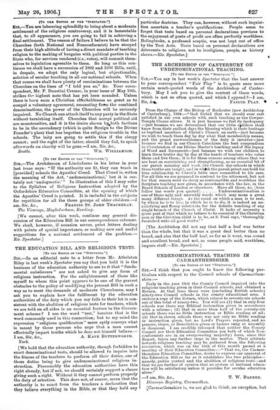THE ARCHBISHOP OF CANTERBURY ON UNDENOMINATIONAL TEACHING.
[To THE EDITOR OF THE "SPECTATOR."' SIE,•—•You say in last week's. Spectator that the best answer to your correspondent " Fair Play " is to quote once more certain much-quoted words of the Archbishop of Canter- bury. May I ask you to give the context of these words, which is not so often quoted, and which I append ?—I am, From the Charge of the Bishop of Rochester (now Archbishop of Canterbury), 1894 :—" God forbid that we should ever rest satisfied in our own schools with such teaching as the Cowper- Temple Clause allows. It is just because we feel its inadequacy —just because we are determined that our little cipildren shall know from their earliest days the blessing which is their heritage as baptised members of Christ's Church on earth—just because we wish to teach them day by day what that membership means, and the grand answerableness of the duty it involves—just because we find in our Church Catechism the best compendium in Christendom of our Divine Master's teaching and of His legacy of Word and Sacrament—just because we wish our children to learn these truths day by day at the hands of teachers who value them and lire them; it is for these reasons among others that we are bent on maintaining and strengthening, as an essential bit of our parish ministry and work. the Church day-schools in which these truths are taught, and in which the parish priest can hold his true relationship to Christ's little ones committed to his care. For all this we are prepared to contend to the uttermost, but not for that reason need we decry as contemptible and worthless the Scripture teaching now given, in accordance with the law, in the Board Schools of London or elsewhere. Have all those, &c. [here follow the words you quoted] Ilndenominationalism is one of those ugly and unwieldy words which may mean a great many different things. As the creed on which a man is to rest, by which be is to live, in which he is to die, it is indeed an un- satisfying and flimsy substitute for the definite teaching of any single branch of the Church of Christ. It lacks of necessity a great part of that which we believe to be essential if the Christian man or the Christian child is to be, as S. Paul says, thoroughly furnished unto all good works.'" [The Archbishop did not say that half a loaf was better than the whole, but that it was a great deal better than no bread, and also that the half loaf, as far as it went, was sound and excellent bread, and not, as some people said, worthless, impure stuff.—ED. Spectator.]










































 Previous page
Previous page